小学英语作文新思路.docx
小学英语作文新思路

小学英语作文新思路
小学英语作文是培养学生语言运用能力的重要方式。
以下是一些新思路,可以帮助学生拓宽思维,提高写作技能:
1. 日常生活观察:鼓励学生观察日常生活中的小事,比如早晨起床的
过程、上学路上的风景等,用英语描述这些场景。
2. 角色扮演:让学生扮演不同的角色,如动物、历史人物或虚构角色,写一篇自我介绍或日记,增加作文的趣味性。
3. 情感表达:引导学生表达自己的情感,如快乐、悲伤或愤怒,通过
写作来练习如何用英语表达这些情感。
4. 故事创作:让学生创作一个简短的故事,可以是童话、科幻或冒险
故事,鼓励他们使用丰富的想象力。
5. 环境问题讨论:让学生关注环境问题,如垃圾分类、节能减排等,
写一篇关于如何保护环境的作文。
6. 节日庆祝:每个节日都有其独特的文化和习俗,让学生写一篇关于
自己如何庆祝某个节日的作文。
7. 科技与未来:激发学生对科技的兴趣,让他们想象未来的生活,写
一篇关于未来科技的作文。
8. 文化差异:让学生了解不同国家的文化差异,写一篇关于自己国家
文化与其他文化比较的作文。
9. 个人成长:鼓励学生反思自己的成长过程,写一篇关于自己克服困难或学习新技能的经历。
10. 书信写作:练习写信,可以是给朋友的信、给老师的感谢信或者给虚构人物的信。
11. 日记记录:让学生养成写日记的习惯,记录每天的所见所闻和所感。
12. 图片描述:给学生一张图片,让他们用英语描述图片中的场景、人物和可能发生的故事。
通过这些新思路,学生的英语作文不仅能够提高语言能力,还能够培养他们的创造力、批判性思维和跨文化交流的能力。
小学英语作文新思路

小学英语作文新思路随着全球化的不断深入,英语作为国际通用语言的重要性日益凸显。
在中国,英语教育已经成为了小学阶段的重要课程。
其中,英语作文写作是衡量学生英语综合运用能力的重要标准之一。
然而,对于许多小学生来说,写作可能是一个难题。
因此,探索新的教学方法,提高小学生的英语写作能力,成为了教育者面临的重要任务。
一、鼓励自由表达,激发写作兴趣兴趣是最好的老师。
在英语写作教学中,教师应该鼓励学生自由表达自己的想法和感受,激发他们的写作兴趣。
例如,教师可以引导学生从描述自己的日常生活开始,让他们写一些关于自己日常生活的短文。
这样不仅可以让学生有话可说,而且可以让他们在写作过程中感受到英语的表达方式和语言魅力。
二、注重词汇积累,夯实写作基础词汇是英语写作的基础。
然而,对于小学生来说,词汇量的积累是一个长期的过程。
因此,教师在教学过程中应该注重帮助学生积累词汇。
例如,教师可以引导学生通过阅读英文文章、听英文歌曲、看英文电影等多种方式来积累词汇。
教师还可以通过开展一些词汇游戏等活动,帮助学生更好地记忆单词。
三、教授写作技巧,提高写作水平在帮助学生积累了一定量的词汇后,教师还需要教授学生一些基本的写作技巧。
例如,如何构思文章结构、如何运用语法和标点符号等。
通过这些技巧的教授,教师可以帮助学生更好地组织语言、表达思想,进一步提高他们的写作水平。
四、开展合作写作,促进互相学习合作写作是一种有效的学习方式。
在英语写作教学中,教师可以引导学生开展合作写作,促进他们互相学习。
例如,教师可以让学生分组写作一篇文章,每个小组内的学生可以共同讨论、分工合作。
通过这种方式,学生可以在合作过程中互相学习、互相帮助,提高自己的写作能力。
五、及时反馈评价,增强写作信心对于小学生的英语作文,教师需要及时给予反馈和评价。
在评价时,教师应该注重肯定学生的优点和进步,同时指出他们的不足之处并提出改进意见。
通过及时的反馈评价,教师可以帮助学生更好地认识自己的写作水平,增强他们的写作信心。
小学教师英语作文写作思路

小学教师英语作文写作思路As a primary school teacher, I have always believedthat teaching English to young learners is not just about teaching them vocabulary and grammar, but also about instilling in them a love for the language and a desire to communicate effectively. In this essay, I will discuss my approach to teaching English to primary school students and share some of the strategies I use to make learning fun and engaging for them.To begin with, I believe that creating a positive and supportive learning environment is crucial for helping young learners develop their English language skills. In my classroom, I strive to create a welcoming and inclusive atmosphere where students feel comfortable expressing themselves and taking risks with their language. I encourage them to speak up in English, even if they make mistakes, and I always praise their efforts and progress.In addition to fostering a positive learningenvironment, I also believe in making English lessons fun and interactive for my students. I use a variety of teaching methods and activities to keep them engaged and motivated, such as games, songs, role-plays, and storytelling. I find that incorporating these elements into my lessons not only helps students retain new vocabulary and grammar structures, but also makes learning English an enjoyable experience for them.Furthermore, I believe that it is important to tailor my teaching approach to the individual needs and learning styles of my students. Some students may learn best through visual aids, while others may prefer hands-on activities or group work. By understanding the unique strengths and challenges of each student, I am able to adapt my teaching methods to ensure that every student has the opportunity to succeed in learning English.In conclusion, teaching English to primary school students is a rewarding and fulfilling experience. By creating a positive learning environment, making lessons fun and interactive, and catering to the individual needsof my students, I am able to help them develop their English language skills and cultivate a love for the language. I am proud to be a primary school teacher and to have the opportunity to inspire young learners to become confident and proficient English speakers.。
小学英语作文写作技巧(附范文)
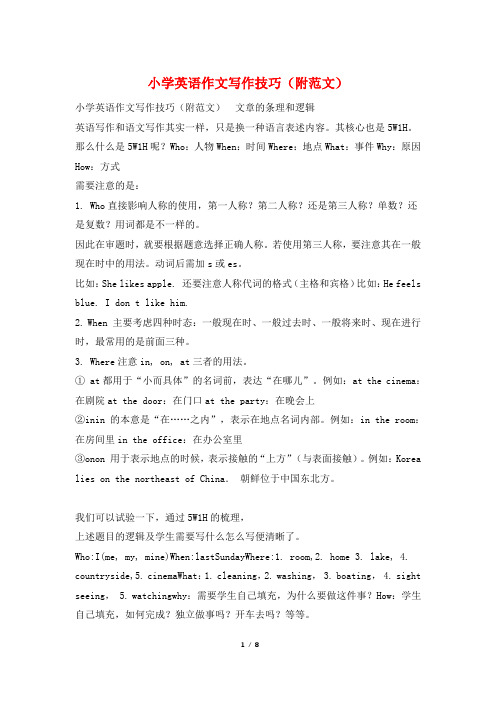
小学英语作文写作技巧(附范文)小学英语作文写作技巧(附范文)文章的条理和逻辑英语写作和语文写作其实一样,只是换一种语言表述内容。
其核心也是5W1H。
那么什么是5W1H呢?Who:人物When:时间Where:地点What:事件Why:原因How:方式需要注意的是:1. Who直接影响人称的使用,第一人称?第二人称?还是第三人称?单数?还是复数?用词都是不一样的。
因此在审题时,就要根据题意选择正确人称。
若使用第三人称,要注意其在一般现在时中的用法。
动词后需加s或es。
比如:She likes apple. 还要注意人称代词的格式(主格和宾格)比如:He feels blue. I don t like him.2. When 主要考虑四种时态:一般现在时、一般过去时、一般将来时、现在进行时,最常用的是前面三种。
3. Where注意in, on, at三者的用法。
① at都用于“小而具体”的名词前,表达“在哪儿”。
例如:at the cinema:在剧院at the door:在门口at the party:在晚会上②inin 的本意是“在……之内”,表示在地点名词内部。
例如:in the room:在房间里in the office:在办公室里③onon 用于表示地点的时候,表示接触的“上方”(与表面接触)。
例如:Korea lies on the northeast of China.朝鲜位于中国东北方。
我们可以试验一下,通过5W1H的梳理,上述题目的逻辑及学生需要写什么怎么写便清晰了。
Who:I(me, my, mine)When:lastSundayWhere:1. room,2. home 3. lake, 4. countryside,5. cinemaWhat:1. cleaning,2. washing, 3. boating, 4. sight seeing, 5. watchingwhy:需要学生自己填充,为什么要做这件事?How:学生自己填充,如何完成?独立做事吗?开车去吗?等等。
小学如何写英语作文的方法和技巧
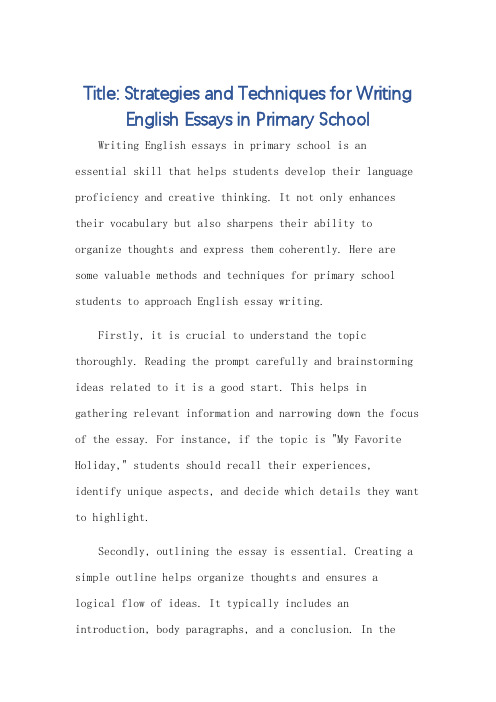
Title: Strategies and Techniques for Writing English Essays in Primary SchoolWriting English essays in primary school is anessential skill that helps students develop their language proficiency and creative thinking. It not only enhances their vocabulary but also sharpens their ability to organize thoughts and express them coherently. Here are some valuable methods and techniques for primary school students to approach English essay writing.Firstly, it is crucial to understand the topic thoroughly. Reading the prompt carefully and brainstorming ideas related to it is a good start. This helps in gathering relevant information and narrowing down the focus of the essay. For instance, if the topic is "My Favorite Holiday," students should recall their experiences,identify unique aspects, and decide which details they want to highlight.Secondly, outlining the essay is essential. Creating a simple outline helps organize thoughts and ensures alogical flow of ideas. It typically includes an introduction, body paragraphs, and a conclusion. In theintroduction, students should provide a brief overview of the topic and state their main point or thesis. The body paragraphs should elaborate on the main ideas, supported by examples and details. Finally, the conclusion sums up the essay and leaves a lasting impression.Thirdly, using appropriate vocabulary and sentence structure is key. Students should aim to use a variety of words and avoid repeating the same phrases. They can enhance their vocabulary by reading widely and noting new words they encounter. Additionally, practicing writing simple yet effective sentences helps in expressing ideas clearly.Fourthly, incorporating descriptive language can make the essay more engaging. Students can use their senses (sight, sound, smell, touch, taste) to describe scenes, events, or feelings. For example, instead of saying "I had a good holiday," they can write, "The sun shined brightly, and the sea breeze made me feel refreshed and happy during my holiday."Lastly, proofreading and editing are vital steps. Students should read their essays aloud to check forgrammar errors, spelling mistakes, and flow. They can also ask a friend or teacher to read their work and provide feedback. This helps in identifying and correcting any issues, making the essay more polished and professional.In conclusion, writing English essays in primary school is a rewarding experience that fosters language development and creative expression. By following these methods and techniques, students can improve their essay writing skills and produce engaging, well-structured pieces.**小学如何写英语作文的方法和技巧**在小学阶段,写英语作文是一项重要的技能,它有助于提高学生的语言水平,并培养他们的创造性思维。
小学学生英语作文写作技巧和方法

小学学生英语作文写作技巧和方法Writing Great English Compositions: Tips for Elementary StudentsDo you ever feel stuck when you have to write an English composition for school? Don't worry, you're not alone! Writing can be hard, but with some helpful tips and tricks, you can become a composition writing pro. Let me share some secrets to make your writing shine.Getting StartedOne of the biggest challenges is just getting started. You have a blank page staring back at you, and your mind goes blank too! Here's what I do when that happens:Brainstorm ideas by making a list or drawing a picture related to the topic. Let your imagination run wild and jot down anything that pops into your head. Silly ideas are okay!Talk it out with a friend, parent, or even your favorite stuffed animal. Saying your thoughts out loud can help ideas flow.Read other examples on the same topic to get inspired. Just don't copy them word-for-word.Once you have some ideas brewing, it's time to organize your thoughts into an outline. Decide what your main ideas will be and put them in a logical order. Your outline is like a road map that will guide your writing journey.Catching Your Reader's AttentionNow you're ready to write that introduction, or opening paragraph. This is super important because it needs to grab your reader's attention and make them excited to read more. Try one of these catchy opener lines:A rhetorical question: "Have you ever wondered why dogs chase cats?"A striking statement: "The rainforest is alive with hundreds of colorful toucans."An imaginative scenario: "Imagine you could breathe underwater like a fish!"Don't give away too much in the opener though. You want to leaveyour reader curious and eager to read the rest of your composition.Developing Your IdeasThe body paragraphs are where you really expand on your main points with lots of juicy details and examples. Don't just tell your readers bland facts. Help them experience what you're writing about with:Vivid descriptions using adjectives: "The deep blue ocean sparkled like diamonds."Metaphors and similes: "The ballerina leaped across the stage like a gazelle."Personal anecdotes: "Last summer, I went camping and spotted a family of deer..."Make sure to explain your points clearly, and connect each paragraph smoothly using transition words like "additionally," "for example," and "in contrast."Adding PersonalityWhat makes a piece of writing truly spectacular? Giving it your own unique voice and personality! Don't be afraid to sprinkle in your thoughts, feelings, and even appropriate humor throughout your composition.Here are some ways to make your writing more lively and engaging:Use contractions: "It's" instead of "it is"Incorporate idioms and clichés: "A picture is worth a thousand words."Vary your sentence structure with short, long, and thought-provoking linesRemember, you want your readers to feel like you're having a conversation with them, not just reading a dull book report.Wrapping It All UpYou made it to the conclusion - the last push to the finish line! Here's where you'll summarize your main points and leave your readers thinking. Try to:Restate your key ideas in a fresh wayConnect back to your opening line or scenarioEnd with an insightful or thought-provoking questionA great ending can truly make your whole composition shine.Polishing Your DraftBefore turning in your composition, be sure to polish it up by editing and revising:Check spelling, grammar, and punctuationMake sure your ideas flow smoothlyReplace any dull words with more descriptive onesRead your writing aloud to catch awkward phrasingIt's also wise to have a parent, teacher or friend provide feedback. A fresh set of eyes can spot areas that need improvement.So don't stress about writing compositions. With preparation, creativity, and a sprinkling of your unique voice, you can craft engaging essays that will impress your teachers and dazzle your readers. Just remember to take it step-by-step, have fun with it, and keep practicing. Before you know it, you'll be an English composition expert!。
小学英语作文教学思路

小学英语作文教学思路第一篇:小学英语作文教学思路浅谈小学英语作文教学摘要:目前的小学已经不同程度地开设了英语课程,小学英文写作也被列入了英语考试的范畴。
如何在这个阶段发挥小学生的英语知识水平和英语学习特点,写出优秀的小学生英语作文呢?作为小学英语教师,为了有针对性地培养小学生的英语写作能力,首先要分析小学生英语作文存在的问题;其次,“对症下药”找寻正确的辅导方法,最后才能在实践中发挥事半功倍的作用。
在教学中教授学生一定的思路和方法,让学生能够通过这种简单的方法有效地完成语言简练、内容浅显易懂,但思路清晰条理,语言准确的文章,就是我们最终也是最大的收获。
关键词:小学生英语作文兴趣有效随着社会不断向前推进,社会生活的信息化和经济的全球化,使得英语的重要性日益突出。
英语作为最重要的信息载体之一,已成为人类生活各个领域中使用最广泛的语言。
近几年,各种英文类的考试当中,作文都成为了不可或缺的项目,也是测查学生综合运用英语能力的主要途径。
目前的小学已经不同程度地开设了英语课程,小学英文写作也被列入了英语考试的范畴。
《新课程标准》要求小学阶段的英语教学要使学生掌握一定的英语基础知识和听、说、读、写技能,形成一定的语言综合运用能力。
写作有助于词汇、语法、句型、课文等语言知识的学习,并能够促进听、说、读和思维能力的潜在性发展。
同时,听、说、读和思维能力的发展又反作用于写作能力的培养。
写作教学对于帮助学生了解英语思维方式,形成用英语进行思维的习惯,提高学生综合运用知识的能力大有益处。
但是英语写作是一项不容易掌握的语言技能,从单词拼写到语法结构,从谴词造句到整篇布局,无一不反映了学生的实际水平。
小学阶段,英文写作一般考查小学生的语言运用能力,写作内容简单、实用。
如何在这个阶段发挥小学生的英语知识水平和英语学习特点,写出优秀的小学生英语作文呢?作为小学英语教师,为了有针对性地培养小学生的英语写作能力,首先要分析小学生英语作文存在的问题;其次,“对症下药”找寻正确的辅导方法,最后才能在实践中发挥事半功倍的作用。
小学新思维英语作文模板
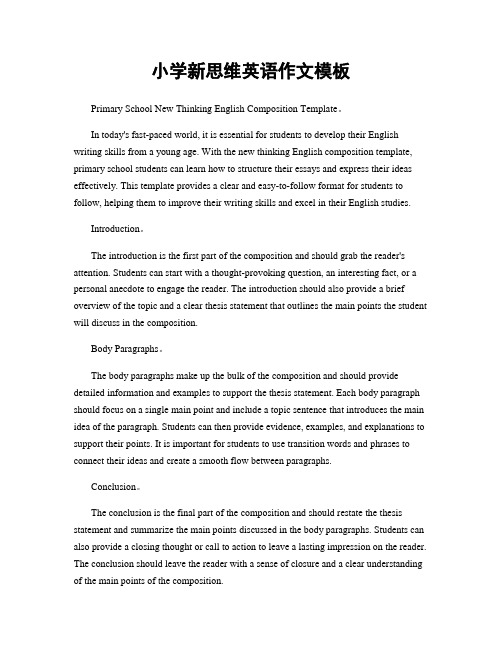
小学新思维英语作文模板Primary School New Thinking English Composition Template。
In today's fast-paced world, it is essential for students to develop their English writing skills from a young age. With the new thinking English composition template, primary school students can learn how to structure their essays and express their ideas effectively. This template provides a clear and easy-to-follow format for students to follow, helping them to improve their writing skills and excel in their English studies.Introduction。
The introduction is the first part of the composition and should grab the reader's attention. Students can start with a thought-provoking question, an interesting fact, or a personal anecdote to engage the reader. The introduction should also provide a brief overview of the topic and a clear thesis statement that outlines the main points the student will discuss in the composition.Body Paragraphs。
小学英语作文写作技巧

小学英语作文写作技巧Introduction:Writing an essay in English can be a daunting task for primary school students. However, with the right approach and a few key strategies, students can improve their writingskills and produce well-structured and engaging compositions. Here are some essential tips to help primary school students excel in English essay writing.1. Understanding the Topic:Begin by ensuring that the student fully understands thetopic of the essay. Encourage them to ask questions orclarify any terms they are unsure about. This will provide a solid foundation for their writing.2. Brainstorming Ideas:Encourage students to brainstorm ideas related to the topic. This can be done through mind mapping or listing down all the thoughts that come to mind. This process helps in generating a rich pool of ideas to draw from when writing.3. Organizing Thoughts:Once the ideas are generated, help students to organize them logically. This can be done by grouping similar ideas together and deciding on the order in which they will be presented in the essay.4. Writing an Outline:An outline is a blueprint for the essay. It should include the introduction, main points, and conclusion. Writing an outline helps students to structure their thoughts and ensures that the essay flows well.5. Drafting the Introduction:The introduction should grab the reader's attention and provide a brief overview of what the essay will discuss. Teach students to write a strong opening sentence followed by a clear statement of the essay's purpose.6. Developing the Body Paragraphs:Each body paragraph should focus on one main idea. Teach students to start each paragraph with a topic sentence, followed by supporting details and examples. Ensure that each paragraph is connected to the next for a smooth transition.7. Using Simple and Clear Language:Primary school students should use language that is age-appropriate and easy to understand. Encourage them to write in simple sentences and to avoid complex vocabulary that might confuse the reader.8. Incorporating Vocabulary and Grammar:While simplicity is key, students should also be encouraged to use a variety of vocabulary and correct grammar. This can be achieved through regular reading, vocabulary exercises, and grammar lessons.9. Revising and Editing:After the first draft is complete, it's important to reviseand edit the essay. Teach students to look for spelling mistakes, grammatical errors, and areas where the writing could be clearer or more concise.10. Practicing Regularly:The more students practice writing, the better they will become. Encourage them to write essays on a variety of topics to improve their skills and build confidence.Conclusion:English essay writing is a skill that can be developed with patience and practice. By following these tips, primary school students can enhance their writing abilities and produce compositions that are both enjoyable to write and to read. Remember, the goal is to make the process as engaging and educational as possible for young learners.。
小学英文作文书写思路

小学英文作文书写思路英文:When it comes to writing an English composition in primary school, I usually follow these steps:Step 1: Brainstorming。
Before I start writing, I like to brainstorm my ideas.I think about the topic and jot down any words or phrases that come to mind. This helps me organize my thoughts and decide what I want to include in my composition.Step 2: Outlining。
Next, I create an outline for my composition. I divide it into different sections and decide what information I want to include in each section. This helps me stay focused and ensures that my composition has a clear structure.Step 3: Writing。
Once I have my ideas and outline, I start writing my composition. I try to use a variety of sentence structures and vocabulary to make my writing more interesting. I also make sure to proofread my work to correct any mistakes.中文:在小学写英语作文时,我通常会遵循以下步骤:步骤1,头脑风暴。
小学学生英语作文写作技巧和方法
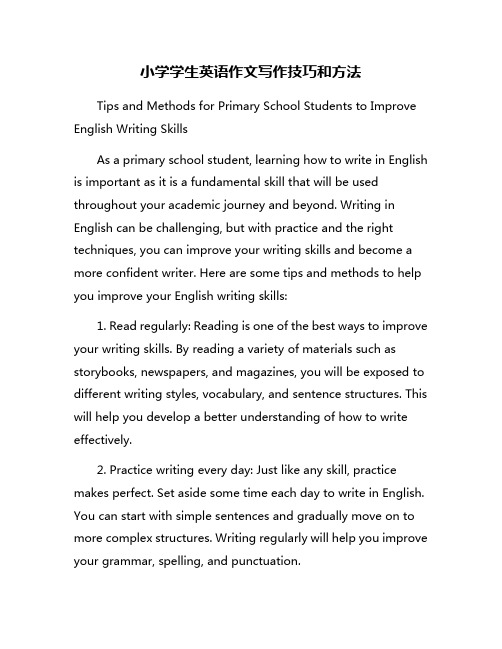
小学学生英语作文写作技巧和方法Tips and Methods for Primary School Students to Improve English Writing SkillsAs a primary school student, learning how to write in English is important as it is a fundamental skill that will be used throughout your academic journey and beyond. Writing in English can be challenging, but with practice and the right techniques, you can improve your writing skills and become a more confident writer. Here are some tips and methods to help you improve your English writing skills:1. Read regularly: Reading is one of the best ways to improve your writing skills. By reading a variety of materials such as storybooks, newspapers, and magazines, you will be exposed to different writing styles, vocabulary, and sentence structures. This will help you develop a better understanding of how to write effectively.2. Practice writing every day: Just like any skill, practice makes perfect. Set aside some time each day to write in English. You can start with simple sentences and gradually move on to more complex structures. Writing regularly will help you improve your grammar, spelling, and punctuation.3. Expand your vocabulary: Building a strong vocabulary is essential for writing effectively. Try to learn new words every day and use them in your writing. You can create flashcards, use vocabulary apps, or participate in word games to help you remember new words and their meanings.4. Focus on grammar and punctuation: Good grammar and punctuation are crucial for clear and effective writing. Practice using correct grammar rules and punctuation marks such as commas, periods, and quotation marks. You can also ask your teachers or parents to check your writing for any mistakes.5. Plan your writing: Before you start writing, it is important to plan what you want to say. Jot down your ideas, create an outline, and organize your thoughts. This will help you structure your writing and make it easier for your readers to understand your message.6. Revise and edit your writing: After you have finished writing, take the time to revise and edit your work. Check for any spelling or grammar errors, improve your vocabulary choices, and make sure your sentences are clear and concise. You can also ask someone else to read your writing and provide feedback.7. Practice different types of writing: Writing comes in many forms such as essays, stories, reports, and letters. Try your hand at different types of writing to improve your skills and creativity. Experiment with different genres and styles to find what works best for you.8. Seek feedback and guidance: Don't be afraid to ask for help when you need it. Your teachers, parents, or classmates can provide valuable feedback on your writing and offer suggestions for improvement. Take their advice seriously and use it to enhance your writing skills.By following these tips and methods, primary school students can improve their English writing skills and become more confident writers. Remember that writing is a skill that takes time and practice to develop, so be patient and persistent in your efforts. With dedication and hard work, you can become a proficient writer and communicate effectively in English. Good luck!。
小学如何写英语作文的方法和技巧

小学如何写英语作文的方法和技巧How to Write English Compositions in Primary SchoolWriting English compositions can be a challenging task for primary school students, especially those who are just beginning to learn the language. However, with some guidance and practice, students can develop the skills needed to write coherent and engaging compositions. In this article, we will discuss some methods and techniques that can help primary school students improve their English composition writing.1. Plan Before You WriteBefore starting to write your composition, it is important to plan out what you want to say. This can help you organize your thoughts and ensure that your composition has a clear structure. You can start by brainstorming ideas for your composition and then creating an outline that includes an introduction, body paragraphs, and a conclusion. Planning ahead can save you time and make the writing process more efficient.2. Use Simple and Clear LanguageWhen writing compositions, it is important to use simple and clear language that is appropriate for your level of English proficiency. Avoid using complicated vocabulary and complexsentence structures that might confuse the reader. Instead, focus on using words and phrases that you are familiar with and that convey your ideas clearly. Remember that simplicity is key when it comes to writing effective compositions.3. Practice Grammar and PunctuationGrammar and punctuation are essential components of writing in English. Make sure to review the basic rules of grammar and punctuation, such as subject-verb agreement, tenses, and sentence structure. Pay special attention to punctuation marks such as commas, periods, and apostrophes, as they can change the meaning of your sentences. Practice writing sentences with correct grammar and punctuation to improve your writing skills.4. Use Descriptive LanguageTo make your compositions more interesting and engaging, try using descriptive language to paint a vivid picture for the reader. Use adjectives and adverbs to describe people, places, and events in your composition. Show, don't tell - instead of simply stating facts, use descriptive language to evoke emotions and create a memorable reading experience for your audience.5. Edit and Revise Your WorkAfter you have finished writing your composition, take the time to edit and revise your work. Check for spelling and grammatical errors, and make sure that your sentences are clear and concise. Look for ways to improve the flow of your composition and make sure that your ideas are presented in a logical order. Ask a teacher or parent to review your composition and provide feedback for further improvement.6. Read and Learn from ExamplesOne of the best ways to improve your English composition writing is to read and learn from examples of good writing. Read books, articles, and essays written by professional writers to get a sense of different writing styles and techniques. Pay attention to how authors structure their compositions, use language effectively, and engage the reader. By studying examples of good writing, you can improve your own writing skills and develop your own unique style.In conclusion, writing English compositions in primary school can be a rewarding and enjoyable experience. By following these methods and techniques, students can develop the skills needed to write clear, engaging, and effective compositions. Remember to plan ahead, use simple and clear language, practice grammar and punctuation, use descriptivelanguage, edit and revise your work, and read and learn from examples. With practice and perseverance, you can become a confident and skilled writer of English compositions.。
小学生英语作文构思模板
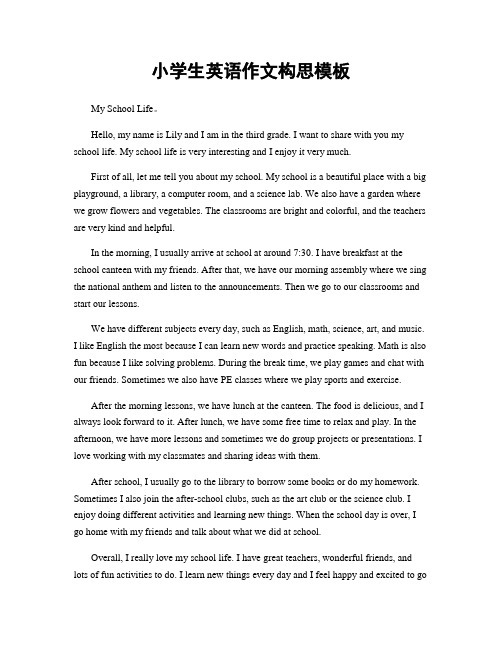
小学生英语作文构思模板My School Life。
Hello, my name is Lily and I am in the third grade. I want to share with you my school life. My school life is very interesting and I enjoy it very much.First of all, let me tell you about my school. My school is a beautiful place with a big playground, a library, a computer room, and a science lab. We also have a garden where we grow flowers and vegetables. The classrooms are bright and colorful, and the teachers are very kind and helpful.In the morning, I usually arrive at school at around 7:30. I have breakfast at the school canteen with my friends. After that, we have our morning assembly where we sing the national anthem and listen to the announcements. Then we go to our classrooms and start our lessons.We have different subjects every day, such as English, math, science, art, and music.I like English the most because I can learn new words and practice speaking. Math is also fun because I like solving problems. During the break time, we play games and chat with our friends. Sometimes we also have PE classes where we play sports and exercise.After the morning lessons, we have lunch at the canteen. The food is delicious, and I always look forward to it. After lunch, we have some free time to relax and play. In the afternoon, we have more lessons and sometimes we do group projects or presentations. I love working with my classmates and sharing ideas with them.After school, I usually go to the library to borrow some books or do my homework. Sometimes I also join the after-school clubs, such as the art club or the science club. I enjoy doing different activities and learning new things. When the school day is over, I go home with my friends and talk about what we did at school.Overall, I really love my school life. I have great teachers, wonderful friends, and lots of fun activities to do. I learn new things every day and I feel happy and excited to goto school. I can't wait to see what new adventures and experiences await me in the future. Thank you for reading about my school life!。
小学生新学期打算英文作文四篇

小学生新学期打算英文作文四篇新的学期就要来了。
在这个新学期中,学习生活又要有了新的打算。
以下是店铺为大家整理的新学期打算英文作文范文四篇,欢迎大家阅读。
英文作文篇一The new semesterHappy summer vacation has passed, the new semester began, I was a pupil of grade 3.Recall just learning attitude and methods of the first grade feel very bad, also is very poor. The teacher often criticize me, also don't let students play with me. Then I don't want to go to school. Also don't have confidence in learning, learning achievement is terrible.Teacher zhang's appearance let me find the road to confidence. With the help of the teacher zhang and encouragement I became a good young pioneers. Also become very sunlight, very lively, it is the teacher changed me. I later will work harder.The following is my study plan:A listening carefully in class, and actively answer the teacher's questions.Second, we must read more books, especially helpful to their learning of books to read more and more.Three studies have not understand place, should actively ask ask teachers and classmates, to be a good student enquiry.Four guys to complete the teacher assigned homework and class assignments every day.In the new semester I will work harder, strive for all get good grades in every subject, continue to be a \"sunshine boy\"working hard.翻译:新学期的打算快乐的暑假过去了,新的学期开始了,我已经是一名三年级的小学生啦。
新思路英语作文模板
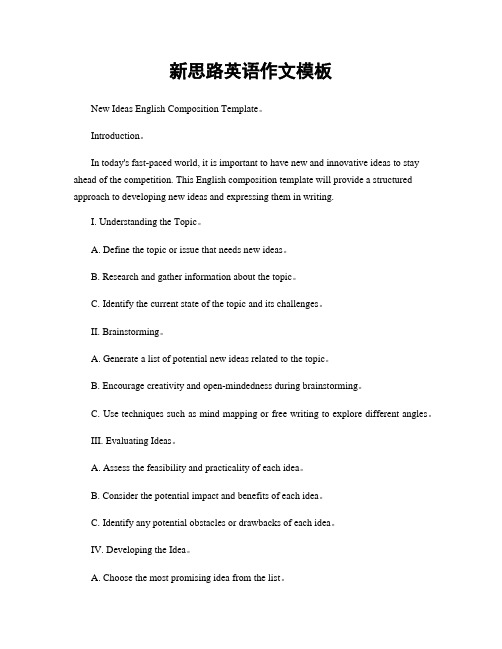
新思路英语作文模板New Ideas English Composition Template。
Introduction。
In today's fast-paced world, it is important to have new and innovative ideas to stay ahead of the competition. This English composition template will provide a structured approach to developing new ideas and expressing them in writing.I. Understanding the Topic。
A. Define the topic or issue that needs new ideas。
B. Research and gather information about the topic。
C. Identify the current state of the topic and its challenges。
II. Brainstorming。
A. Generate a list of potential new ideas related to the topic。
B. Encourage creativity and open-mindedness during brainstorming。
C. Use techniques such as mind mapping or free writing to explore different angles。
III. Evaluating Ideas。
A. Assess the feasibility and practicality of each idea。
B. Consider the potential impact and benefits of each idea。
新思路英语作文模板

新思路英语作文模板英文回答:Innovative Approaches to English Language Teaching: Templates for Writing Success。
In a rapidly evolving educational landscape, teachers have the responsibility to adapt and innovate their teaching methodologies to meet the changing needs of their students. This is particularly true in the realm of English language instruction, where the traditional approaches are often falling short of preparing students for the 21st-century workforce.In response to these challenges, educators are increasingly turning to new ideas and approaches to enhance the teaching and learning of English, with a particular focus on the development of writing skills. Templates offer a unique and effective avenue to this end, providing students with structured frameworks that guide theirwriting process and help them produce high-quality written work.Benefits of Using Templates in English Language Teaching。
小学英语写作方法和技巧
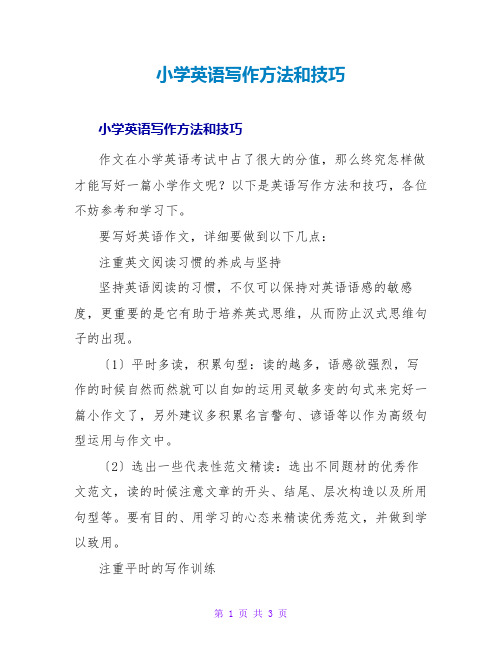
小学英语写作方法和技巧小学英语写作方法和技巧作文在小学英语考试中占了很大的分值,那么终究怎样做才能写好一篇小学作文呢?以下是英语写作方法和技巧,各位不妨参考和学习下。
要写好英语作文,详细要做到以下几点:注重英文阅读习惯的养成与坚持坚持英语阅读的习惯,不仅可以保持对英语语感的敏感度,更重要的是它有助于培养英式思维,从而防止汉式思维句子的出现。
〔1〕平时多读,积累句型:读的越多,语感欲强烈,写作的时候自然而然就可以自如的运用灵敏多变的句式来完好一篇小作文了,另外建议多积累名言警句、谚语等以作为高级句型运用与作文中。
〔2〕选出一些代表性范文精读:选出不同题材的优秀作文范文,读的时候注意文章的开头、结尾、层次构造以及所用句型等。
要有目的、用学习的心态来精读优秀范文,并做到学以致用。
注重平时的写作训练英语写作训练可以以日记、话题或仿写的.形式来进展。
通过坚持一个学期的英语日记,保持英语写作的习惯。
所以一定要坚持每周两到三次的写作训练,正所谓习惯成自然就是这个道理。
五步写出一篇好作文什么才是好作文呢?很多同学误认为只要像学校平时测验那样子“句子构造正确,无单词拼写错误”就应该得总分值。
而小升初对作文的考核并非如此简单,同学们应该走出对英语写作认识上的误区。
那么除了以上两个方面外,我们怎样才能写出一篇优秀作文而在小升初中获取高分呢?下面就来看我们的“高分作文五步法”。
〔1〕认真审题,确定时态人称,同时关注题材格式时态:故事性文章一般用过去时,其中表达感受时可用如今时。
说明性或议论性文章一般用如今时,举例时可用过去时。
根据题目要求也会出现时态的交织使用,如过去和如今的比照等。
假如句中出现了时间状语,时态那么要遵循时间状语。
如ago,last…过去时;next,in…将来时等人称:注意在句子中人称的统一。
例如:Thanks to the teachers, we have improved our English.其中we和our就是人称的统一。
尝试新思路创新的英语作文

Innovation is the key to progress and development in any field.It is the driving force that propels society forward and allows us to adapt to the everchanging world.Embracing new ideas and approaches is essential for growth,both on a personal and societal level.One of the most significant aspects of innovation is the willingness to challenge the status quo.This involves questioning established norms and practices,and seeking out alternative solutions to problems.By doing so,we can uncover new possibilities and opportunities that might have otherwise gone unnoticed.To foster innovation,it is crucial to cultivate an environment that encourages creativity and openmindedness.This can be achieved through various means,such as promoting collaboration,providing resources for research and development,and rewarding those who take risks and explore new ideas.Moreover,innovation often requires a deep understanding of the subject matter and the ability to think critically.By continuously learning and expanding our knowledge,we can better identify areas where improvements can be made and develop more effective strategies for addressing challenges.In addition to intellectual curiosity,perseverance is another vital component of innovation.The process of developing new ideas and bringing them to fruition can be fraught with obstacles and setbacks.However,those who remain committed to their vision and are willing to persevere through difficulties are more likely to achieve success. Furthermore,innovation is not limited to any particular field or industry.Whether its in science,technology,arts,or social issues,there is always room for improvement and the potential for groundbreaking discoveries.By remaining open to new ideas and approaches,we can make significant strides in advancing our understanding of the world and improving the quality of life for all.In conclusion,innovation is a multifaceted process that requires a combination of creativity,critical thinking,and perseverance.By embracing new ideas and challenging the status quo,we can unlock the potential for growth and progress in every aspect of our lives.It is through this continuous pursuit of innovation that we can shape a brighter future for ourselves and for generations to come.。
(完整word版)小学英语作文新思路.doc
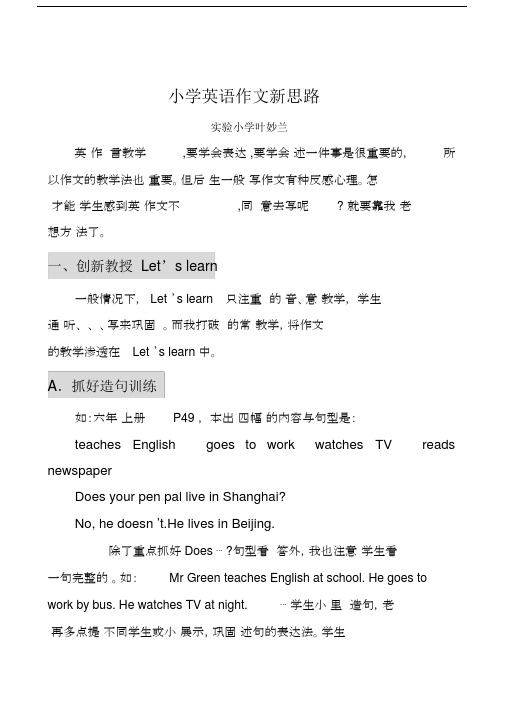
小学英语作文新思路实验小学叶妙兰英作言教学,要学会表达 ,要学会述一件事是很重要的,所以作文的教学法也重要。
但后生一般写作文有种反感心理。
怎才能学生感到英作文不,同意去写呢?就要靠我老想方法了。
一、创新教授 Let’s learn一般情况下, Let ’s learn只注重的音、意教学,学生通听、、、写来巩固。
而我打破的常教学,将作文的教学渗透在Let ’s learn 中。
A.抓好造句训练如:六年上册P49 ,本出四幅的内容与句型是:teaches English goes to work watches TV reads newspaperDoes your pen pal live in Shanghai?No, he doesn ’t.He lives in Beijing.除了重点抓好 Does ⋯ ?句型看答外,我也注意学生看一句完整的。
如:Mr Green teaches English at school. He goes to work by bus. He watches TV at night.⋯学生小里造句,老再多点提不同学生或小展示,巩固述句的表达法。
学生多了就能看一句完整的了。
B.加上开头与结尾,组成一篇文章。
如才的四幅,我注意引学生把四幅的意思起来,加上开与尾,成一篇文章。
像描写人的文章,我会提醒学生加上介姓名 :This is Mr Green. 加上 :He’ s a teacher加.上四幅的内容 :He teaches English at school. He goes to work by bus. He watches TV at night. He often reads newspaper every day .再加个点尾 Ilike Mr Green. He’ s a good teacher就.成了一篇学生比容易写的文章。
在我的引下,大部分学生能写出篇文章。
- 1、下载文档前请自行甄别文档内容的完整性,平台不提供额外的编辑、内容补充、找答案等附加服务。
- 2、"仅部分预览"的文档,不可在线预览部分如存在完整性等问题,可反馈申请退款(可完整预览的文档不适用该条件!)。
- 3、如文档侵犯您的权益,请联系客服反馈,我们会尽快为您处理(人工客服工作时间:9:00-18:30)。
百度文库- 让每个人平等地提升自我小学英语作文新思路实验小学叶妙兰英作言教学,要学会表达 ,要学会述一件事是很重要的,所以作文的教学法也重要。
但后生一般写作文有种反感心理。
怎才能学生感到英作文不,同意去写呢 ?就要靠我老想方法了。
一、创新教授 Let ’s learn一般情况下, Let ’s learn只注重的音、意教学,学生通听、、、写来巩固。
而我打破的常教学,将作文的教学渗透在Let ’s learn中。
A.抓好造句训练如:六年上册P49 ,本出四幅的内容与句型是:teaches English goes to work watches TV reads newspaperDoes your pen pal live in Shanghai?No, he doesn’ lives in Beijing.除了重点抓好Does ⋯ ?句型看答外,我也注意学生看一句完整的。
如:Mr Green teaches English at school. He goes to work by bus. He watches TV atnight.⋯学生小里造句,老再多点提不同学生或小展示,巩固述句的表达法。
学生多了就能看一句完整的了。
B.加上开头与结尾,组成一篇文章。
如才的四幅,我注意引学生把四幅的意思起来,加上开与尾,成一篇文章。
像描写人的文章,我会提醒学生加上介姓名:This is Mr Green.加上:He ’ as teacher. 加上四幅的内容 :He teaches English at school. He goes to work by bus. He watches TV at night. He often reads newspaper every day .再加个点尾 I like Mr Green. He’ sa good teacher. 就成了一篇学生比容易写的文章。
在我的引下,大部分学生能写出篇文章。
通引地教每的Let ’s learn ,学生都得作文不,也有信心写出意的几句来了。
二、拓展 Let ’s talk.1.改编对话,拓展对话能力。
如:五年下册P59 Let’s talk:文内容是A: I see the mother elephant .B: What is she doing? A: She is walking. B: What about the baby elephant? What is itdoing? A: It’ s running.在学完、操了重点句型:What is⋯doing?后,我学生仿文个:物在干什么。
我提示学生:除了用上今天所学句型外,可以用上以前的知,如:两人面,天气,喜的季及活,再去物园,后再物在什么,并加上一个好尾,如It’funs today./I love animals.等。
老注意学生系新旧知,学生不断在学新知的同,不地运用旧知,帮助学生更好地合运用,使学生在原有的基上改,拓展学生的能力,学生心中要的多起来,那么得多,写也会好起来的。
2.巧妙地把 Let ’s talk组成一篇文章。
如:六年上册P71 Let ’ s talk: Where does the rain come from? It comes from the clouds. Where does thecloud come fr om? It comes from the vapour.⋯我先用听音的形式学生听音回答,再理解文后学生填空:does the rain come from?____ ____comes from the clouds.does the cloud come from? ____ ____comes from the vapour. 3⋯ 4⋯我学生完成四个答填空,只在原文改小小,就能更好地帮助学生理解文内容,然后把四个答句合起来,(The rain comes from the clouds. The clouds comes from the vapour. The vapour comes from the water in the river. Thesun shines and the water becomes vapour.)加上个尾How funny!就成一篇由水成雨的有趣文章。
我一点,原本很的水 - 蒸气 - 云 - 雨的文章,学生学起来、起来都容易。
在 ,学生都可以出好五句的由水成雨的文章了。
三、花心思设计Let ’s read.Let ’s read教学重点是学生的能力,提高学生的写作能力。
因此,let ’s read的教学形式可多化,学生感到有趣,而不是的回答、判断、等有些枯燥的。
1.模仿写作如六年下册 P30 Let ’ s read: Wu Yifan was busy last weekend. He visited his grandparents Saturday morning. Itwas his grandma ’ s birthday. They cooked noodles together. In the evening, they watched TV . Sunday morning, Wu Yifan played football with his friends. In the afternoon , he washed his clothes and cleaned his room.篇文章要引学生写上周末做的事情。
学生在学了在行、一般在与一般将来后,再来写去做的事情,部分学生很容易混乱与的用法。
于是,我出一个文章的主干,学生根据提示模仿写作,学生更容易掌握写作技巧。
如:My mother was busy last weekend. She ⋯ (ed) ⋯ Sat.morning. She ⋯ (ed) ⋯ Sat.afternoon.In the evening ,she⋯.(ed)⋯Sunday morning, she ⋯ (ed) ⋯ . In the afternoon ,she ⋯ (ed) ⋯ . She was busy and tired. So I must help my mother do housework.(She⋯ (ed)⋯是提醒学生:用去式)出的提示,学生会更容易,会更容易掌握写作方法与作文的思路,从而提高写作技巧。
2.改变人称同是六年下册P30 Let ’ s read(原文在第 1 点里),我会在第二引学生把Wu Yifan 成写自己,把文章里的其他人称改,成介自己的文章。
我会先例:Wu Yifan was busy last weekend. 成: I was busy last weekend. 我注意引把原文 he I , they we 等,后学生小每一句怎,什么?再小,全班来正小的,后全班一来用第一人称I改写的文章。
通个方式,学生更清楚去式里不同人称在一般情况下是加 ed,去式没有受人称的限制而,只是受去的影响而成去式。
而且通方式,学生更熟悉文的内容与句子的表达法,学生更理解,更容易写好不同人称的作文。
3.用自己的话总结要点如:六年下册P18,写流感的文章。
篇文章有点。
于我通两个来: 1.流感的特征How do you feelif you have the flu? 2. 处理方法 What do you do if you have theflu? 我让学生小组讨论并汇报,不同小组汇报汇总如下:1。
If I have the flu, I feel sick. I have a sore throat. My nosehurts. I have a headache and have a . See the doctor, take some medicine and drink hot drinks. Stay in bed for a few days, I willfeel better soon.我引导把两个答句组合起来,用自己的话总结性地讲出流感的特征与处理方法。
这样处理比原文中的:Do you havea headache? If you have a fever, you might have the flu.好理解得多了。
现在,学生都会说、会写了。
四、巧读 Let ’s learn平时读书,我并不是要求学生单单读几个单词或词组。
我要求学生看图讲一句完整的话,把几句话连起来,加上开头与结尾,组成一篇文章。
长此以往地早读或读书,学生习惯看图讲话,心中有话可写了。
如:六年级下册P40 Let ’s learn :bought presents saw elephants rowed a boat wentskiing went ice skating图一至图三是写Amy, 其余是讲Sarah 。
于是我让学生齐读时加一个开头:I have two good friends. They areAmy and Sarah.再加上描写Amy与Sarah的句子:Amybought presents with her mother on her holiday.She saw elephants in the zoo. She rowed a boat inthe river. Sarah went skiing and went ice skating onher holiday.再加一个结尾:They were very happy.那就读成一篇文章。
每一个 Let ’s learn都可以以短文形式读出。
学生读多了、讲多了,看图作文就心中有话可讲、有话可写,也乐意写了。
五、幽默作文错误。
如:六年上册第五元作文,我布置学生先回去思考怎描写 Miss, 提示可以从姓名、年、外貌、工作、上班方式、好等介。
我学生自己先写出文章,在第二天上小并正。
在小自己里的文章里,我走下去看了部分学生的作文,并把部分的句子用自己的本了收集起来。
等小完,我把班里得比离的句子写出来:Miss Ye is a girl. She’s48 years old. She’s short and tall. She has a long hair.She has small eyes and a big mouse.She likeswimming ⋯.部分学生看到些句子就哈哈笑了。
我小再并正。
我在他言正前:“原来我是一个女孩呀?!16已是 woman了!我才30,有个同学我已48 了,怎么我自己了更年期我都不知道?!而且老到只有一条!a long hair真的好恐怖噢!本来说我有个大嘴巴,却说我有只大老鼠!快点帮我抓老鼠呀!”我一边说一边在错的下面划一条线。
